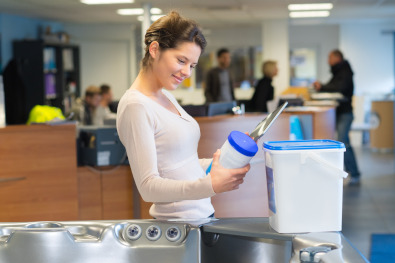Hot tub water. PH, Bromine, Alkalinity and Calcium. What do each do?
February 15/2024
Maintaining proper water chemistry in a hot tub is crucial for optimal performance, water clarity, and bather comfort. Here's an overview of the key parameters and their roles in hot tub water:
pH: pH is a measure of the water's acidity or alkalinity. The ideal pH range for hot tub water is typically between 7.2 and 7.8. Maintaining the proper pH level is important because:
Bather comfort: Balanced pH ensures that the water is neither too acidic nor too alkaline, minimizing skin and eye irritation.

Sanitizer effectiveness: The pH level can affect the efficiency of sanitizers like bromine or chlorine. If the pH is too high or too low, the sanitizer may not work as effectively.
Equipment protection: Imbalanced pH levels can lead to corrosion of metal components or scaling on surfaces, potentially damaging the hot tub equipment.
Bromine or Chlorine: Bromine or chlorine are commonly used sanitizers in hot tubs to kill bacteria, viruses, and other contaminants. They serve the following purposes:
Disinfection: Bromine or chlorine sanitizers help maintain clean and hygienic water by killing harmful microorganisms.
Oxidation: Sanitizers with oxidizing properties help break down organic waste, such as body oils and lotions, preventing the buildup of scum lines and maintaining water clarity.
Bather safety: Proper sanitizer levels ensure that the water is safe for bathers by minimizing the risk of waterborne illnesses.
Total Alkalinity: Total alkalinity refers to the concentration of alkaline substances, primarily bicarbonates and carbonates, in the water. It acts as a buffer, helping to stabilize the pH level. The key roles of total alkalinity are:
pH stability: Proper total alkalinity levels prevent rapid pH fluctuations, providing stability to the water chemistry.
pH adjustment: Total alkalinity affects the ability to adjust and maintain the desired pH range. If the total alkalinity is too low, the pH may become unstable and difficult to control.
Calcium Hardness: Calcium hardness refers to the concentration of dissolved calcium ions in the water. It is important for the following reasons:
Preventing equipment damage: Adequate calcium hardness helps prevent corrosion of metal components and scaling on surfaces.
Water balance: Proper calcium hardness levels contribute to overall water balance, which is essential for water clarity and bather comfort.
Preventing foaming: Low calcium hardness levels can contribute to foaming in the water, which may affect bather comfort.
It's important to note that the specific ideal ranges for pH, bromine or chlorine, total alkalinity, and calcium hardness may vary depending on the hot tub manufacturer's recommendations, water source, and other factors. Regular testing with a reliable water testing kit is necessary to monitor and adjust these parameters to maintain balanced water chemistry. Follow the manufacturer's guidelines and consult with a pool and spa professional for specific recommendations for your hot tub.
Comments
No Comments at this time!
Go to top of page